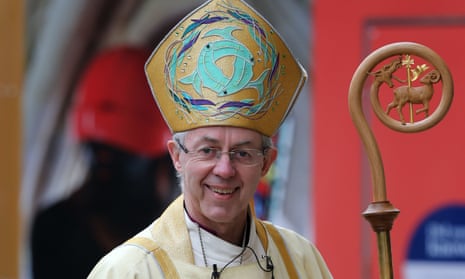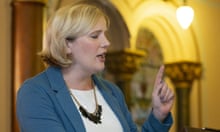The Church of England has pulled out of an attempt to buy the loan book of the collapsed payday lender Wonga following a week of talks led by the archbishop of Canterbury, Justin Welby, aimed at protecting the interests of vulnerable borrowers.
The move creates fresh uncertainty for around 200,000 borrowers who could now be forced to pay back their debts at high rates by a commercial lending firm.
Welby said on Friday that the C of E commissioners, who control an £8.3bn investment portfolio, had decided not to participate in any buyout, but the potential investors he has been in talks with are now expected to make a bid for the estimated £400m loan book.
Welby has been engaged all week in a round of meetings and phonecalls with unidentified financial investors and charitable foundations in a bid to put together a consortium that could have ultimately resulted in the creation of an ethical payday lender.
The church said in a statement: “The church understands that confidential approaches may now be made by those interested parties to the administrators of Wonga’s UK loan book. The Church of England will not be party to continuing discussions given their commercially sensitive nature.”
The archbishop was reportedly enthusiastic about the church helping buy the loan book as he has repeatedly clashed with Wonga, which charged borrowers interest rates as high as 5,853% per annum before rates were capped by ministers in 2015 and now stand at about 1,500%.
In 2013 he told the company’s chief executive he wanted to put it out of business by supporting rival community lending schemes.
He told the TUC conference last week: “I said to the chief executive of Wonga that I wanted credit unions to compete him out of business. Well, he’s gone!”
The church commissioners are understood to have argued that they did not have the expertise to properly value the distressed loan book and they were concerned that the need to write off certain loans could be legally problematical given its status as an entity set up to benefit of the church.
“My chief concern has been to ensure that the poor and vulnerable are as well protected as possible following the collapse of Wonga’s UK business,” Welby said. “I fully support and respect the decision of the church commissioners not to participate in a potential buy out. They have given this option close attention and I thank them for their time, advice and consideration.”
He continued: “I will be continuing to examine ways to make affordable credit, debt advice and support more widely available and convening interested parties at Lambeth Palace. If we make the economy fairer for all, we will also make it stronger. When prosperity and justice go hand in hand, every part of society benefits.”










